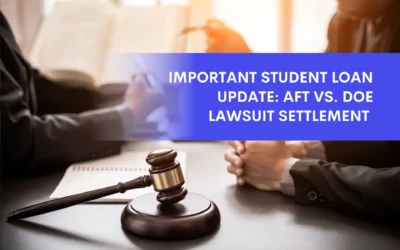Do Student Loans Affect Credit Score?
Student loans certainly affect your credit score. The bigger question, however, is whether this impact is negative or positive.
To understand this better, let’s examine how student loans impact your credit score and your role in this process.
How Student Loans Affect Your Credit Score
Several key factors influence your credit score to varying degrees. While some have more impact, like your payment history, others can do less good or damage to it.
Below is a summary of these factors and how much they impact your credit score.
| Factor | Description | Percentage Impact |
| Payment History | Record of on-time or late payments on all credit accounts. | 35% |
| Credit Utilization | The ratio of used credit to available credit on revolving accounts (e.g., credit cards). | 30% |
| Length of Credit History | The average age of your credit accounts and the age of your oldest account. | 15% |
| Credit Mix | Variety of credit types, such as revolving credit (credit cards) and installment loans. | 10% |
| New Credit (Hard Inquiries) | Number of recent applications for credit, indicated by hard inquiries on your report. | 10% |
Still, how do your student loans control the impact of these factors on your credit score?
Payment History
Student loans fall under the category of installment loans— a type of loan where you borrow a fixed amount and repay it in regular installments over time.
This repayment structure directly ties your student loans to your payment history, which accounts for 35% of your credit score calculation.
Your payment history is also used to assess your sense of “financial responsibility,” something every lender considers strongly. A consistent, on-time monthly payment shows that you’re financially responsible.
However, even one late payment (typically reported after 30 days past due) can cause a noticeable drop in your score. Repeated late payments or defaults on student loans can have lasting effects, staying on your credit report for up to seven years.
💡 To protect your score, consider setting up automatic payments or creating reminders to ensure payments are never missed.
Length of Credit History
Student loans are among the first credit accounts opened by borrowers. So, it makes sense how your student loans can affect your credit score in this regard.
If you take out student loans during college, they help establish your credit history, even while you’re still in school and not yet required to make payments (for Federal student loans in deferment).
A longer credit history, such as this, generally improves your score, as it demonstrates sustained financial activity.
There’s also the “Average Age of Account” factor, meaning a well-managed, active credit account positively influences your credit score calculation.
It’s important to note that paying off a student loan in full doesn’t instantly remove its influence. A closed account with a positive payment history remains on your credit report for up to 10 years, continuing to contribute to the length of your credit history.
However, if student loans are your only long-standing accounts and they’re paid off, your average account age could drop once they’re removed from your report, slightly reducing your score.
💡 Building other credit accounts, like credit cards or car loans, ensures that your credit history remains solid even after your student loan is paid off.
Credit Mix
As good as it sounds, managing a single credit type isn’t just enough. You need others in the mix.
Student loans contribute to diversifying your credit mix, especially when you also have other credit types like credit cards.
A good credit mix shows lenders that you can handle different types of debt responsibly, and this can impact your score.
Your credit mix has a smaller weight compared to other factors, so having a student loan alone in the mix won’t drastically improve your score. Still, a lack of credit diversity could slightly hinder your score if you only rely on one type of credit.
💡 While a diverse credit mix is good, it’s not worth taking on unnecessary loans or credit accounts just to diversify.
New Credit (Hard Inquiries)
It’s common practice for lenders to perform a hard inquiry to review your credit report when you’re applying for new student loans or refinance. This inquiry can temporarily reduce your credit score by 5-10 points, depending on your overall credit profile.
Moreover, multiple inquiries in a short time can worsen this effect, particularly if your credit history is limited.
However, you can avoid the compounding effect if you apply to multiple lenders for a student loan or refinance within at least 14-45 days. These inquiries would often be treated as a single inquiry and minimize the impact.
Remember that the effect of a credit inquiry on your credit score is temporary, so managing your student loans responsibly can offset the initial dip.
💡 Regularly check your credit report to ensure inquiries are accurate and authorized.
Federal Student Loans and Credit Scores: Clearing Up Misconceptions
Federal student loans, including Direct Subsidized and Unsubsidized loans, are not credit-based and do not require a credit check. However, they still appear on your credit report as installment loans, which means they can influence your credit score indirectly.
Here’s why some borrowers might notice a dip in their score:
- New Credit Accounts: When a new student loan is disbursed, it is reported as a new credit account. This can temporarily lower the average age of your credit accounts, slightly reducing your score.
- Debt-to-Income Ratio: Although Federal student loans do not rely on your creditworthiness, the reported debt amount may impact your debt-to-income ratio, which some scoring models consider.
While the impact of Federal student loans on your credit score is generally neutral or positive, it’s important to manage them responsibly. Parent PLUS loans, unlike other Federal loans, do require a credit check, which includes a hard inquiry that may temporarily affect your score.
💡 Tip: If you’ve noticed an unexpected drop in your score, check your credit report to ensure accuracy and consider contacting a credit counselor for personalized advice.
5 Things That Could Drag Your Credit Score to the Mud
Among the many factors that could lower your credit score, here are some often overlooked ones.
- Charge-Offs: When a lender writes off your student loan debt as uncollectible (charge-off), it signals severe financial distress. This remains on your credit report for up to 7 years.
- Overlooking Medical Bills: Unpaid medical bills can be sent to collections and negatively affect your credit score. Even small unpaid balances can cause damage if ignored.
- Identity Theft: If someone steals your identity and racks up debt in your name, it can lead to delinquent accounts and ruin your credit.
- Ignoring Errors on Credit Reports: Incorrect negative items on your credit report, such as false late payments or debts, can damage your score if left uncorrected.
- Tax Liens: Unpaid tax liens can appear on your credit report, signaling financial irresponsibility and severely impacting your creditworthiness.
How to Improve a Low Credit Score with a Student Loan
While improper handling of student loans can negatively impact your credit score, these loans can also be used to build a healthy score. Here’s how
- Use Refinancing/Consolidation: Student loan refinancing or consolidating can sometimes lower your interest rates or simplify repayment. This can help you make on-time payments more easily, reducing the risk of missed payments and, in turn, improving your payment history.
- Leverage Auto-Pay: Setting up automatic student loan payments ensures that you never miss a payment, which is crucial for improving your payment history. Some lenders even offer a small rate reduction of 0.25% for choosing this option, which can also make a difference over time.
- Use “Credit Building” As A Strategy: If you have multiple student loans or a single loan with a long repayment term, making partial extra payments towards the principal can reduce your loan balance faster. This increases your credit utilization and lowers your debt-to-income ratio.
Take Charge of Your Finances, Join SLP
The answer to the question “Do student loans affect your credit score?” is a clear yes.
However, the best part is you can decide what the impact would be— whether it would be negative or positive depends on how you handle things.
We’ve outlined a few things that can ruin your credit score and ways you can build a healthy one with your student loans.
You can take it further by seeking professional guidance. Student Loan Professor has assisted thousands of students and graduates in finding options to quickly reduce their debt.
Taking a student loan isn’t a wrong choice; you only need a nudge in the right direction. Get help today!
Brandon Barfield is the President and Co-Founder of Student Loan Professor, and is nationally known as student loan expert for graduate health professions. Since 2011, Brandon has given hundreds of loan repayment presentations for schools, hospitals, and medical conferences across the country. With his diverse background in financial aid, financial planning and student loan advisory, Brandon has a broad understanding of the intricacies surrounding student loans, loan repayment strategies, and how they should be considered when graduates make other financial decisions.





